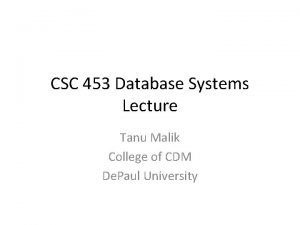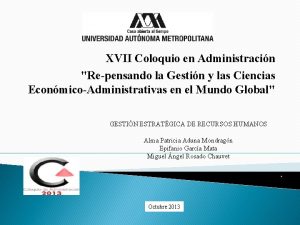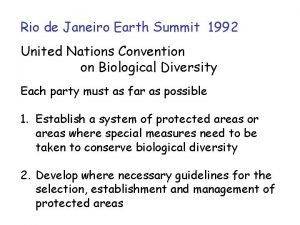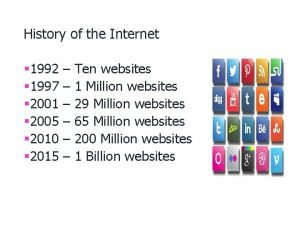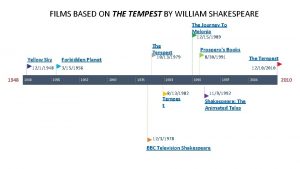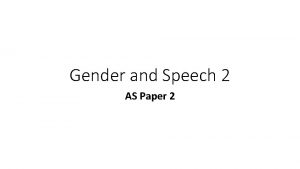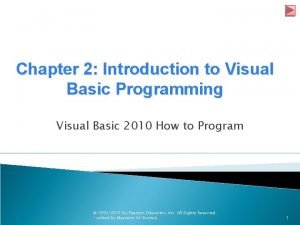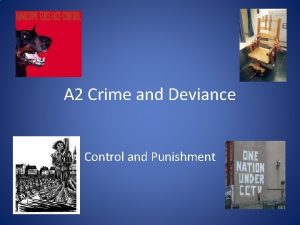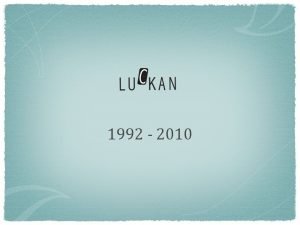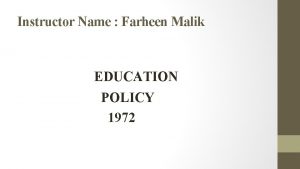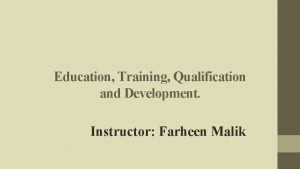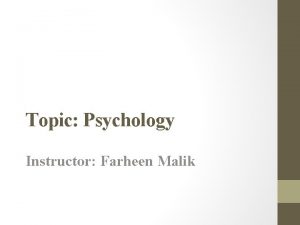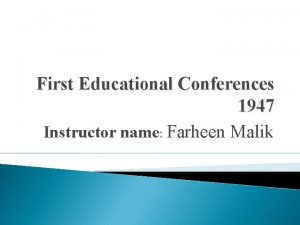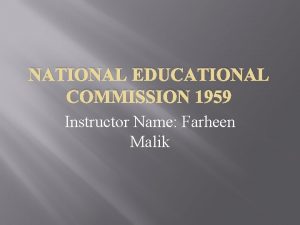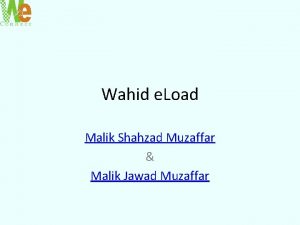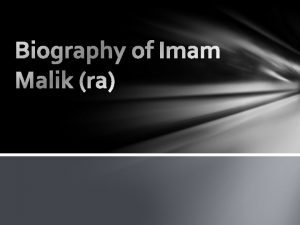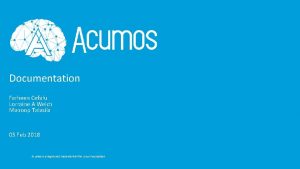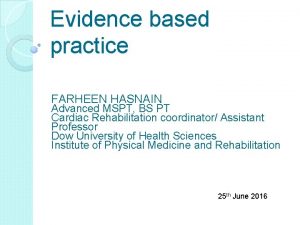Education policy 1992 Instructor Farheen Malik Education policy















- Slides: 15

Education policy 1992 Instructor: Farheen Malik

Education policy 1) 2) 3) 4) Education policy is the principles and government policy making in educational sphere, as well as the collections of laws and rules that governs the operation of education systems Education occurs in many forms for many purposes through many institutions Examples include early childhood education, kindergarten through to 12 th grade , two and four year college or universities, graduate and professional education, adult education and job training Therefore, education policy can directly affect the education people engage in at all ages

National education policy 1992 � NATIONAL EDUCATION POLICY 1992 WAS STRUCTURED ON THE BASIS of “Guide Line” provided by the PM’s directive on 10 th Feb 1991. Federal Minister of education Announced the policy on 20 th December 1992. NATIONAL EDUCATION POLICY Formulated with consultation of teachers, parents, scholars, lawyers, journalists, students representative of public. Planning, Finance and Education ministries and provincial departments were involved to set bench-marks, targets, and implementation.

National education policy 1992 � The socio-political milieu, among other factors, promoted to reshuffle the priorities, restate the policy, revise the strategy, and reexamine the fabric of education in Pakistan. A series of educational conferences were held in the province which were attended by a large number of educationists and educational administrators from the primary to the university level. A national conference was held at Islamabad in April , 1991 under the chairmanship of the federal education minister.

Framework & objectives 1) 2) 3) 4) 5) Promotion of Islamic, social, political, economic & ethical order in society through education. Emphasize women education Making curricula to satisfy the needs of learner in the modern scientific and technological world Creating competitiveness in society for meeting the challenges of the 21 st century Open up avenues for the participation of the private sector in educational development.

Aimed at bringing following changes 1) 2) 3) 4) 5) Structuring the society as dictated by the teaching of Islam. Universalizing primary education, eliminating the drop-out and fulfilling the basic learning needs, by the year 2002. 3. Raising the literacy ratios to 70% by the year 2002 through extensive adult education programs of functional literacy. Rationalizing the problem of medium of instruction. Inviting the private sector for participation in educational programs and allowing progressive disinvestments of educational institution.

Key elements of the policy 1) 2) 3) 4) 5) Opening non-formal education to nongovernmental Achieving 100% literacy in selected districts Setting up model schools male and female in ruler areas Introduction compulsory social service for students Using general schools as technical schools in the evening shift to capture the drop-outs of general education

Primary education was recognized as a fundamental right of every Pakistani child and would be made compulsory and free in order to achieve universal primary education, reduction in dropout rates, and fulfillment of the basic learning needs by the end of the decade. � In due course of time, primary education would be transformed into basic education (elementary education extending to class VIII). The participation rate at primary level would be increased from 66. 3% to 99. 1% in 2002. �

Education for better living � The existing provision of Islamic education formed the basis for the development of new curricula. The religious education was so directed as to facilitate students to learn high ethical and moral values encoded in the spirit of Islam. It also prepared them, at the same time, as members of a healthy, enlightened and forward-looking society.

Women education � �This policy stressed on strengthening women’s education as well. To improve the female education, innovative approaches, both in the formal and non-formal sectors were emphasized. Recognizing the difficulties regarding this vital issue, it stressed on the increased access of females to general and vocational education through a wider spread of educational facilities.

Policy statements � Liberal funds shall be provided for holding national and international seminars, conferences and workshops for social sciences, natural sciences and technology. � Those researchers, who generate information and processes for the development of new technology, shall be appropriately rewarded. � The library of Quaid-e-Azam University will be raised to the status of a national library of science and technology. � Provinces will be encouraged to set up institutes of higher science and technology.

Policy statements � All university administrators will be required to undertake training in management of higher education. � All curriculums will be modernized, in order to accommodate new knowledge and new disciplines. � Universities teachers doing research and producing M. Phils. and Ph. D. students will be granted a research allowance. � Universities may offer a package of incentives in the form of better salaries and research grants to highly qualified teachers.

Policy statements �A ten-year programme for Higher Education development will be prepared by the UGC. � Twenty new universities, 4 in Public Sector and 16 in the Private Sector, will be opened, to meet the rising demand for Higher Education. � At graduate and post-graduate levels of education, compulsory teaching of elementary mathematics, statistics, computers, and philosophy will be introduced for those majoring in social sciences subjects. � A Dean of Students Affairs will be appointed in each educational campus, for promoting and regulating the co-curricular activities of students.

Policy statements A campus security force will be established at each campus. � Such Student Clubs which could enhance academic excellence, sharpen intellectual activities and promote creativity, will be encouraged. � Parents and Alumni Associations will be organized on each campus, for seeking periodical advice about maintaining discipline on the campus. � The Vice-Chancellor will be vested with full authority to expel a student, if he/she is not satisfied with their conduct and behavior. The rule of 80% attendance of classes will be strictly enforced �

conclusion � The different Education Policies clearly bring out that there has been concern regarding the need to reform education. However, the implementation has never matched the fine words of the policies. Financial allocations have been inadequate. The result is that in Pakistan, Education generally and Higher Education, in particular gives the looks of abandoned child.
 Farheen akhtar
Farheen akhtar Priya malik and tanu malik
Priya malik and tanu malik Modelo de zayas (1996)
Modelo de zayas (1996) What is rio de janeiro earth summit 1992
What is rio de janeiro earth summit 1992 Sukhwinder singh cheema
Sukhwinder singh cheema Internet in 1992
Internet in 1992 The tempest shakespeare film
The tempest shakespeare film Comrey & lee 1992
Comrey & lee 1992 Denis johnson, “emergency” (1992)
Denis johnson, “emergency” (1992) Competenze chiave europee
Competenze chiave europee Suna soley şimdiki hali
Suna soley şimdiki hali Moreland and beach (1992)
Moreland and beach (1992) Jane pilkington gender theory
Jane pilkington gender theory Visual basic 1 of 1992.
Visual basic 1 of 1992. Ron clarke 1992
Ron clarke 1992 2010-1992
2010-1992

